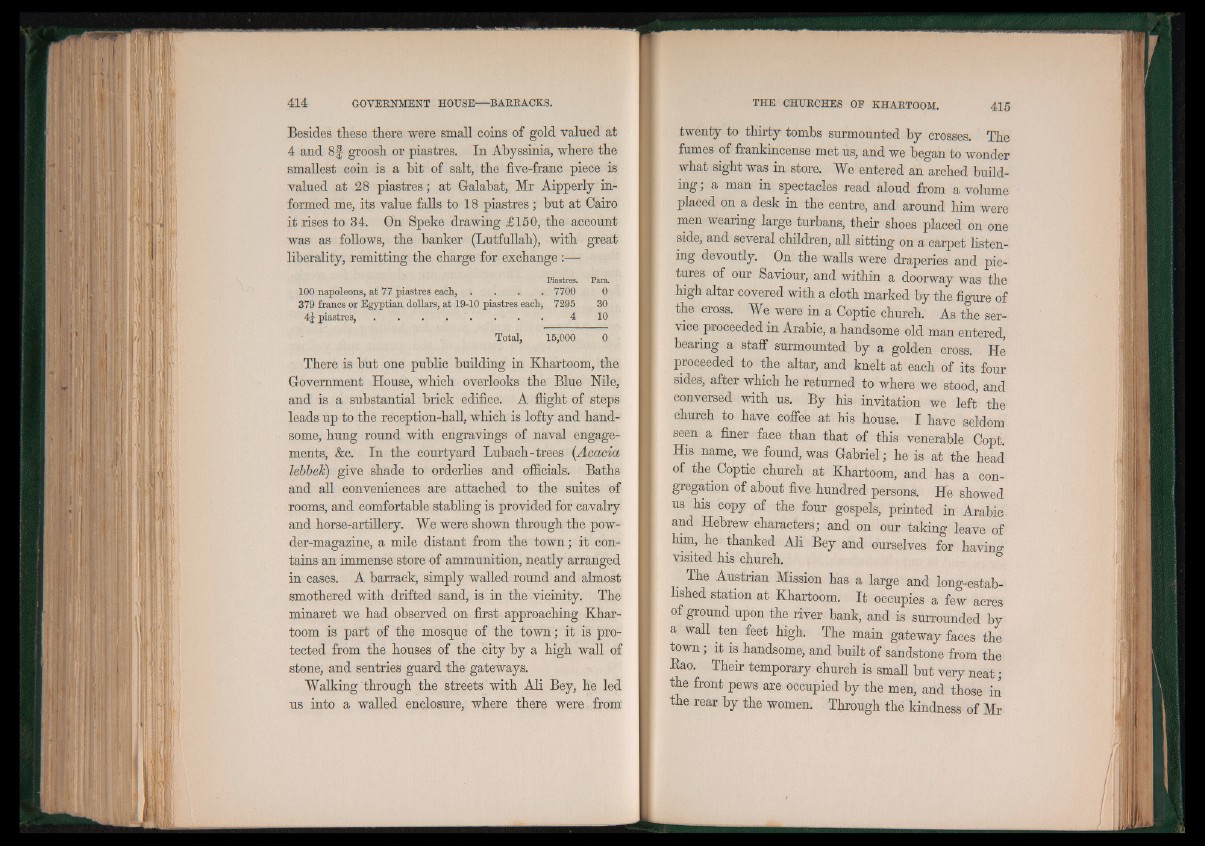
Besides these there were small coins of gold valued at
4 and 8§ groosh or piastres. In Abyssinia, where the
smallest coin is a bit of salt, the five-franc piece is
valued at 28 piastres; at G-alabat, Mr Aipperly informed
me, its value falls to 18 piastres; hut at Cairo
it rises to 34. On Speke drawing £150, the account
was as follows, the hanker (Lutfullah), with great
liberality, remitting the charge for exchange -
Piastres. Para.
100 napoleons, at 77 piastres each, . . . . 7700 0
379 francs or Egyptian dollars, a t 19-10 piastres each, 7295 30
4 J p i a s t r e s , ..................................................................4 10
Total, 15,000 0
There is hut one public building in Khartoom, the
Government House, which overlooks the Blue Nile,
and is a substantial brick edifice. A flight of steps
leads up to the reception-hall, which is lofty and handsome,
hung round with engravings of naval engagements,
&c. In the courtyard Lubach-trees (Acacia
lebbek) give shade to orderlies and officials. Baths
and all conveniences are attached to the suites of
rooms, and comfortable stabling is provided for cavalry
and horse-artillery. We were shown through the powder
magazine, a mile distant from the town; it contains
an immense store of ammunition, neatly arranged
in cases. A barrack, simply walled round and almost
smothered with drifted sand, is in the vicinity. The
minaret we had observed on first approaching Khartoom
is part of the mosque of the town; it is protected
from the houses of the eity by a high wall of
stone, and sentries guard the gateways.
Walking through the streets with Ali Bey, he led
us into a walled enclosure, where there were from
twenty to thirty tombs surmounted by crosses. The
fumes of frankincense met us, and we began to wonder
what sight was in store. We entered an arched building
; a man in spectacles read aloud from a volume
placed on a desk in the centre, and around b im were
men wearing large turbans, their shoes placed on one
side, and several children, all sitting on a carpet listening
devoutly. On the walls were draperies and pictures
of our Saviour, and within a doorway was the
high altar covered with a cloth marked by the figure of
the cross. We were in a Coptic church. As the service
proceeded in Arabic, a handsome old man entered,
bearing a staff surmounted by a golden cross. He
proceeded to the altar, and knelt at each of its four
sides, after which he returned to where we stood, and
conversed with us. By his invitation we left the
church to have coffee at Ms house. I have seldom
seen a finer face than that of this venerable Copt.
His name, we found, was Gabriel; he is at the head
of the Coptic church at Khartoom, and has a congregation
of about five hundred persons. He showed
us his copy of the four gospels, printed in Arabic
and Hebrew characters; and on our taking leave of
him, he thanked Ali Bey and ourselves for having
visited his church.
The Austrian Mission has a large and long-established
station at Khartoom. It occupies a few acres
of ground upon the river bank, and is surrounded by
a wall ten feet high. The main gateway faces the
town; it is handsome, and built of sandstone from the
Their temporary church is small but very neat;
the front pews are occupied by the men, and those in
the rear by the women. Through the kindness of Mr